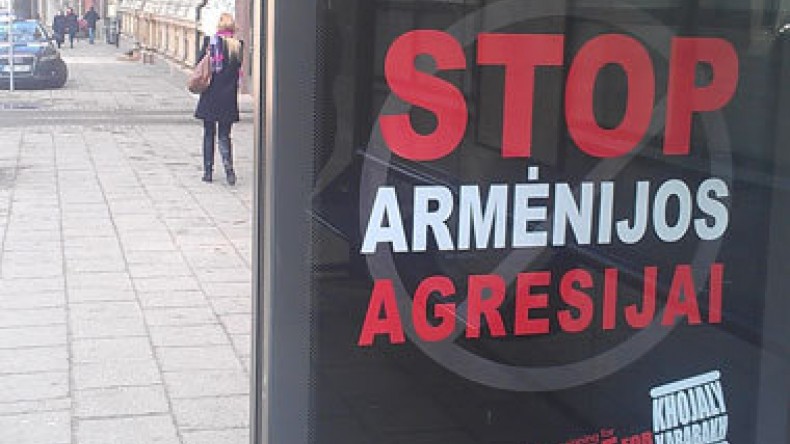
Azerbaijani attempt to spread anti-Armenian posters in Vilnius inciting xenophobia has been suppressed
An attempt of the Azerbaijani government to spread anti-Armenian xenophobic posters in the capital of Lithuania has been suppressed. As Armen Hayrapetyan, the coordinator of Lithuania-Armenia Forum told Panorama.am, yesterday under the framework of the campaign to promote Azerbaijani version of 1992 Aghdam events some posters, ordered by the government of Azerbaijan, appeared in the streets of Vilnius.
The posters that appeared even in public toilets of the city contained racist and xenophobic content against the Armenians. In regard to this, the Armenian side appealed to the Mayor of Vilnius demanding to suppress the incitement of ethnic hatred carried out by means of anti-Armenian propaganda of the Azerbaijani side.
As a result of coordinated action of the Armenian embassy in Lithuania all the posters containing misinformation regarding Aghdam events have been removed.
As Hayrapetyan noted, JCDecaux Company, which is engaged in placement of paid advertisements in the streets of Vilnius, was ordered to make the posters. However, the Armenian Community insisted that it was unacceptable to place calls of xenophobic nature in public places and demanded to remove all the posters immediately.
On February 26, 1992, during the war in Karabakh, around 200 to 300 people (according to Human Right Watch, and 600 according to the version propagated by Azerbaijan) were killed in unknown circumstances near the city of Aghdam. They have been deliberately withheld by the Azerbaijani authorities in the midst of the military actions. Population of the village of Khojalu, which was one of the firing points shooting at the blockaded Stepanakert (among five others) was kept in the village for months by force and was not evacuated by the authorities of Azerbaijan deliberately, in order to use them as human shields later.
Residents of Khojalu coming out through the humanitarian corridor, that the self-defense forces of NKR had left open, freely passed more than 10 km and reached the Aghdam city controlled by the Azerbaijani troops. Later, not far from the positions of Azerbaijani troops dead bodies of the villagers were found. The exact death toll remains unknown as the official Baku publishes data contradicting each other. Parliamentary Commission investigating the tragic death of the civilians at Aghdam city was dissolved by the order of Heydar Aliyev, the investigative materials are kept secret.
Newsfeed
Videos






























